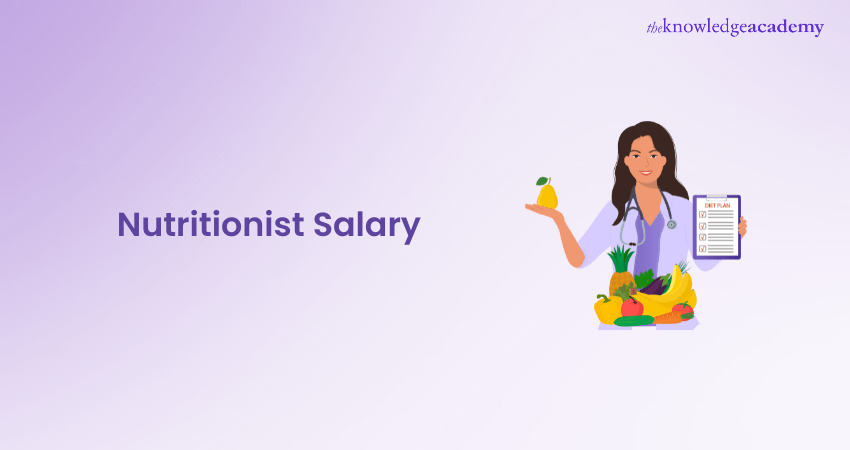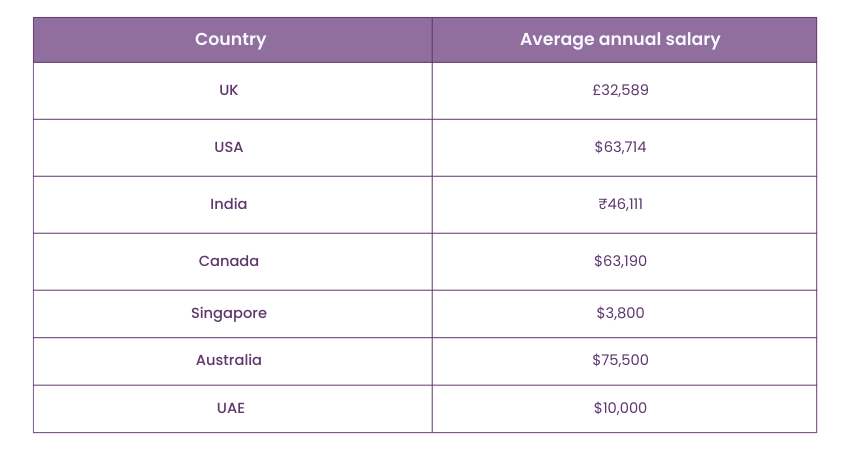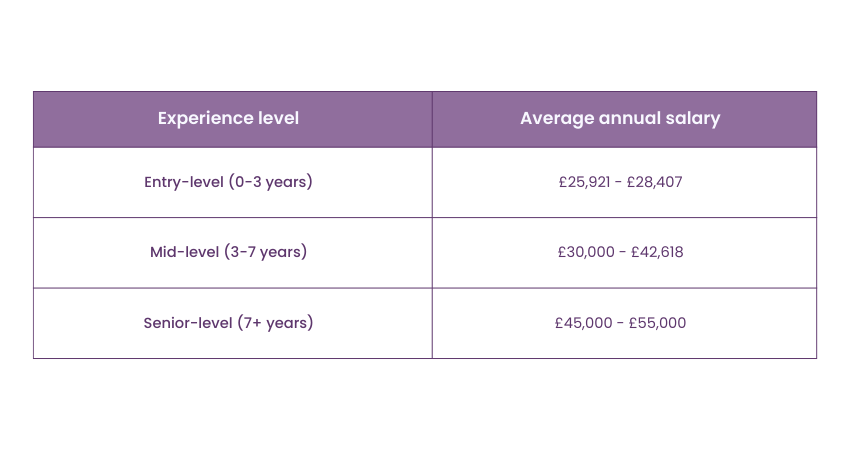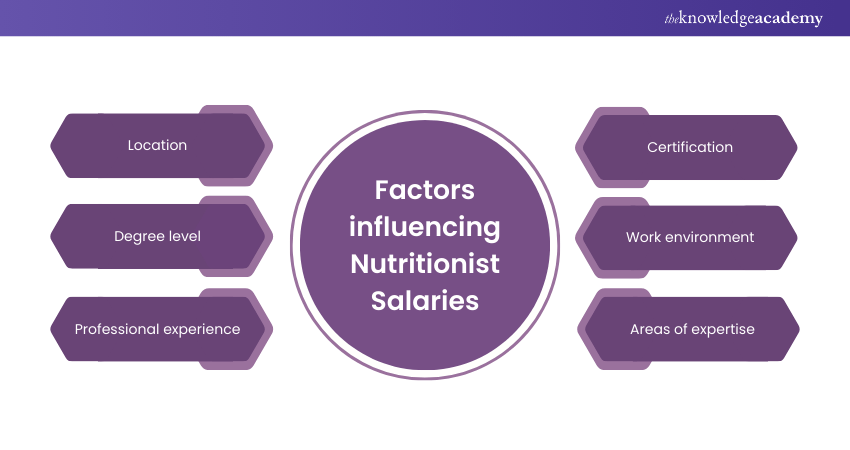We may not have the course you’re looking for. If you enquire or give us a call on +44 1344 203999 and speak to our training experts, we may still be able to help with your training requirements.
Training Outcomes Within Your Budget!
We ensure quality, budget-alignment, and timely delivery by our expert instructors.

Imagine inspiring others to live healthier lives and strengthening your own financial health in the process—this is precisely what you can accomplish as a Nutritionist. This profession imparts valuable wisdom about nutrition and drive us towards positive physical and mental wellbeing. But what exactly are the financial rewards of pursuing this career? In short: What does Nutritionist’s Salary look like?
Nutritionists often work with clients to develop personalised meal plans, evaluate dietary needs, and address specific health concerns, such as athletic performance, weight management, or managing chronic conditions. With ever-growing health-conscious mindsets and the resultant booming global health and Wellness industry, there's no better time to carve your niche as a professional nutritionist.
This blog will guide you with a detailed breakdown of the Nutritionist’s Salary based on education, experience, and location. Read on and explore your potential in this rewarding field.
Table of Content
1) Who is a Nutritionist?
2) Responsibilities of a Nutritionist
3) Average Salary of a Nutritionist Based on Location
4) Average Salary of a Nutritionist Based on Experience
5) Factors Influencing Nutritionist Salaries
6) How to Enhance Your Salary as a Nutritionist?
7) Essential Skills of a Nutritionist
8) Steps to Becoming a Nutritionist
9) Conclusion
Who is a Nutritionist?
A Nutritionist is an authorised and registered professional who educates other people about their general Nutrition and food as well as how the pattern of its ingestion enables or damages a person's health. They offer nutrition guidelines to people managing medical conditions like high blood pressure or obesity.
In most countries, one can become a Nutritionist without an academic degree, though many opt to study a bachelor's in nutrition, a related science degree, or a better degree to get a professional license. Nutritionists are thus different from dietitians, who are masters in dietetics, and their scope of practice may be wider.
Responsibilities of a Nutritionist
As a Nutritionist, your responsibilities can change according to the type of organisation you are working for. However, here are the general day-to-day expectations:
1) Create and deliver educational food-based initiatives to encourage patients and clients to practise healthy lifestyle changes.
2) Help communities, individuals, and workforces make practical and positive changes to health and society.
3) Work on nutrition research projects to widen your knowledge
4) Organise and give presentations as well as training sessions in promoting health and Nutrition for enhanced performance and weight control.
5) Research nutrition guidelines, including the recommended diets, in order to encourage healthy eating and living for individuals and groups.
6) Work as an advisor and a Sports Nutritionist and help understand how diet affects performance and how they can attain the desirable body mass.
7) Provide healthy eating advice to particular client groups, including infants or the elderly, and within specific areas such as sugar reduction.
8) Creates and analyses menus for various organisations such as workplace restaurants and school meals.
9) Work with food production companies to provide nutritional information and secure approval for health claims on packaging.
10) Lead food research, surveys and clinical trials to develop your evidence-based advice
11) Recruit volunteers to take part in clinical trials and dietary surveys
12) Collaborate with other health professionals, who work under the supervision of dietitians, doctors and nurses with patients in hospitals.
13) Share nutritional advice across many mediums such as e-learning tutorials, social media, video podcasts, webinars and seminars.
Discover a path to wellness! Our Healthy Lifestyles Training equips you with essential tools for making positive lifestyle changes.
Average Salary of a Nutritionist Based on Location
The average salary of a Nutritionist can change based on geographic location. Let's look at how much do Nutritionists make in some countries:

Source: Glassdoor
Average Salary of a Nutritionist Based on Experience
Experience is also crucial in determining a Nutritionist's Salary. Let’s look at their salary structure in the United Kingdom:

Source: Glassdoor
Factors Influencing Nutritionist Salaries
Your wages will depend upon how you structure your career as a Nutritionist. Education, speciality, certification, and experience are variables that can make a huge difference in your wages. You can even make more by increasing your education or getting certified. Combining these factors can lead to higher wages.

1) Location
A Nutritionist in London would earn more than someone in a smaller town or rural area due to the higher cost of living in London.
2) Degree Level
Education level makes a huge difference. A master's or a doctoral degree may qualify you for specialised and higher-paying positions. While these roles require high skill, dedication, and knowledge, they typically offer more pay.
3) Professional Experience
It is beneficial to work in different places and with different clients as this way; you will get experience and skills to advance your position and look for better-paid jobs. Probably more experienced Nutritionists might decide to work independently. As an independent practitioner you can be your own boss and set your own schedule to earn more money.
4) Certification
Certifications can boost your career and increase your income. In the UK, professional registration with the Association for Nutrition, or becoming a Registered Nutritionist enhances your credibility and job prospects. Advanced certifications in areas like sports or clinical nutrition can further improve your salary potential.
5) Work Environment
Nutritionists working for the NHS or large private healthcare providers often earn more than those in smaller clinics or community settings. Those in corporate wellness sessions, sports organisations, or food production companies may also earn higher salaries.
6) Areas of Expertise
Your speciality can shape your career path, influencing certifications, workplaces, and potential for private practice or leadership roles. Specialising in areas like sports nutrition, clinical nutrition, or public health can open doors to higher-paying positions.
Fuel your body with knowledge! Explore our Nutrition Course to learn how to make informed food choices for optimal health.
How to Enhance Your Salary as a Nutritionist?
Alongside location and experience level, the potential for an increase in Nutritionist Salary is influenced by various other factors, including personal branding, digital skills and continuous professional development.
Personal Branding
Personal branding is instrumental in shaping career trajectories. and for Nutritionists, that involves cementing a professional identity that helps you stick out from the bandwagon of nutritional professionals.
This may include:
a) Developing a distinctive approach to dietary counselling
b) Showcasing expertise through publications or online content
c) Cultivating a regular and positive online presence
A well-crafted personal brand is crucial for elevate credibility, attracting a more extensive client base and enhancing your salary potential.
Digital Marketing and Sales
Digital platforms have transformed the ways in which businesses and professionals market their services, and Nutritionists are no exception. Digital Marketing strategies, including content creation, Social Media Campaigns, and Search Engine Optimisation (SEO) can significantly expand your reach.
Leveraging online channels, will attract new clients, engage a broader audience, and help you explore opportunities for online consultations. Integrating Digital Marketing techniques into your practice is a surefire way to ensure an uptick in revenue and your salary.
Continued Professional Development
The impact of Continued Professional Development (CPD) on Nutritionist Salary is profound. You can add layers to your expertise by:
a) Engaging in ongoing education
b) Obtaining advanced certifications
c) Participating in specialised training programs
Professional development opens new avenues to diversified salary prospects, including writing, public speaking, research, and consultancy opportunities. Staying updated on preventive and personalised nutrition trends will help you stay ahead of the curve and keep you at the forefront of innovative initiatives in nutrition.
Essential Skills of a Nutritionist
The job of a Nutritionist is friendly, science-based, and contains a lot of communication. Required skills include:
1) Excellent Communication Skills, both written and verbal, coupled with formal Presentation Skills.
2) Passion for helping people and a strong interest in science
3) Great at working within a team
4) Independent working and multitasking skills
5) Good at Time Management and paying great attention to detail
6) The ability to remain calm in stressful situations
7) Ability to use a computer and software appropriately
8) Self-motivated with enthusiasm to encourage and motivate others
9) Commitment to your personal learning and training overall, including CPD.
10) Good eye for business.
11) Empathetic and understanding nature.
12) Great with evaluations, reporting, and data querying.
Steps to Becoming a Nutritionist
There are a few key steps to becoming a Nutritionist, including gaining the right education, practical experience, and professional registration. Here is a brief guide:
1) Acquire the Relevant Education
a) Bachelor's Degree: Begin by pursuing a bachelor's degree in an Association for Nutrition-accredited course related to the field, such as:
BSc. Human Nutrition
BSc. Food and Nutrition
b) Postgraduate Qualification: If you have a bachelor's degree in another field, you might consider pursuing a postgraduate qualification in nutrition, such as:
MSc in Human Nutrition
Postgraduate Diploma in Nutrition
2) Practical experience
a) Internships and placements: Look for internships or placements during your studies to gain practical knowledge.
b) Volunteer Experience: Volunteering with health organisations, hospitals, or community groups can provide valuable experience and enhance your CV.
3) Achieve Professional Registration
a) Register as an Associate Nutritionist with the Association for Nutrition (AfN): Upon completing your accredited degree, you can register with the AfN as a Registered Associate Nutritionist. This demonstrates your professional standard and commitment.
b) Progression to Registered Nutritionist: With further experience and professional development, you can upgrade to Registered Nutritionist status.
4) Obtain other Certifications
a) Specialist Certifications: Pursue additional certifications in specialised subjects like Sports Nutrition, Public Health Nutrition, or Clinical Nutrition. These can enhance your career prospects.
5) Stay Updated and Practice Professional Development
a) Lifelong Learning: Stay updated with the latest research and advancements by attending workshops, seminars, and conferences.
b) Professional Development: Engage in Continuous Professional Development (CPD) activities to maintain your registration and remain competitive in your profession.
6) Create a Professional Network
a) Join Professional Bodies: Join certain professional bodies like the British Dietetic Association (BDA) or the Nutrition Society to network and stay informed about industry developments.
b) Networking: Connect with other Nutritionists at industry events to build a network that can support your career growth.
Energize your life! Dive into our Active and Healthy Lifestyles Training and discover ways to incorporate fitness into your routine.
Conclusion
In conclusion, Nutritionist’s Salary can vary widely based on experience, education, and location. Understanding these factors is vital to navigate the expanding and lucrative wellness sector. Whether you are a budding nutritionist or a seasoned pro, we hope this blog helps you reshape your paycheck.
Transform your health journey! Engage in our Nutrition and Fitness Training for a holistic approach to wellness and vitality.
Frequently Asked Questions

Most Nutritionists in NHS would be on the Agenda for Change (AfC) pay system. They would normally be put on Grade 5, and their salary ranges between £28,482 and £34,581 per year. With sufficient training and experience, they can be eligible for senior positions at bands six and above.

To become a Nutritionist in the UK, it is essential to have an accredited bachelor's degree in nutrition or a related field. Alternatively, you can pursue postgraduate qualifications, such as a master's or diploma in nutrition. Professional registration with the AfN is also vital.

The Knowledge Academy takes global learning to new heights, offering over 30,000 online courses across 490+ locations in 220 countries. This expansive reach ensures accessibility and convenience for learners worldwide.
Alongside our diverse Online Course Catalogue, encompassing 17 major categories, we go the extra mile by providing a plethora of free educational Online Resources like News updates, Blogs, videos, webinars, and interview questions. Tailoring learning experiences further, professionals can maximise value with customisable Course Bundles of TKA.

The Knowledge Academy’s Knowledge Pass, a prepaid voucher, adds another layer of flexibility, allowing course bookings over a 12-month period. Join us on a journey where education knows no bounds.

The Knowledge Academy offers various Healthy Lifestyles Trainings, including Active and Healthy Lifestyles Training, Meditation Course, and Yoga Training. These courses cater to different skill levels, providing comprehensive insights into What is Nutrition.
Our Health and Safety Blogs cover a range of topics related to Healthy Lifestyle, offering valuable resources, best practices, and industry insights. Whether you are a beginner or looking to advance your Health and Safety knowledge, The Knowledge Academy's diverse courses and informative blogs have got you covered.







 Top Rated Course
Top Rated Course




 If you wish to make any changes to your course, please
If you wish to make any changes to your course, please


